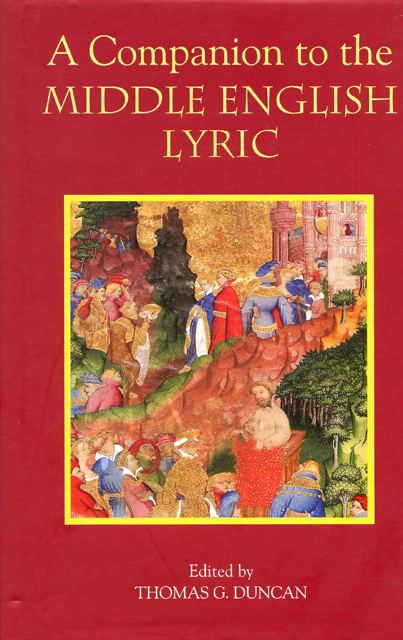Book contents
- Frontmatter
- Contents
- Acknowledgements
- Abbreviations
- Editorial Note
- Introduction
- 1 Middle English Lyrics and Manuscripts
- 2 Middle English Lyrics: Metre and Editorial Practice
- 3 The Love Lyric before Chaucer
- 4 Moral and Penitential Lyrics
- 5 Middle English Religious Lyrics
- 6 Middle English Courtly Lyrics: Chaucer to Henry VIII
- 7 The Middle English Carol
- 8 Political Lyrics
- 9 The Lyric in the Sermon
- 10 ‘Cuius Contrarium’: Middle English Popular Lyrics
- 11 Gender and Voice in Middle English Religious Lyrics
- 12 Lyrics in Middle Scots
- Bibliography of works cited
- Index of Manuscripts Cited
- General Index
- Index of Lyrics
6 - Middle English Courtly Lyrics: Chaucer to Henry VIII
Published online by Cambridge University Press: 23 March 2023
- Frontmatter
- Contents
- Acknowledgements
- Abbreviations
- Editorial Note
- Introduction
- 1 Middle English Lyrics and Manuscripts
- 2 Middle English Lyrics: Metre and Editorial Practice
- 3 The Love Lyric before Chaucer
- 4 Moral and Penitential Lyrics
- 5 Middle English Religious Lyrics
- 6 Middle English Courtly Lyrics: Chaucer to Henry VIII
- 7 The Middle English Carol
- 8 Political Lyrics
- 9 The Lyric in the Sermon
- 10 ‘Cuius Contrarium’: Middle English Popular Lyrics
- 11 Gender and Voice in Middle English Religious Lyrics
- 12 Lyrics in Middle Scots
- Bibliography of works cited
- Index of Manuscripts Cited
- General Index
- Index of Lyrics
Summary
The late Middle English courtly lyrics are less well known and less esteemed than their devotional counterparts, and still are often dismissed as flat, conventional, and repetitious. Some are, but many more, when examined closely in their cultural and historical contexts, become much more interesting works, while a number show poetic and imaginative talents of a high order. The adjective ‘courtly’ applied to these poems cannot be defined in an absolute sense. It suggests, rightly, that they are essentially literary works, sometimes selfconsciously so, written by those who belonged to or moved in the world of the ‘court’ – whether of kings, the high nobility or the lesser gentry – or written for the entertainment and instruction of those who did. But as we shall see, the category is not always self-contained or clearly demarcated. In particular, it is misleading to present the ‘courtly lyric’ as something totally separate from or opposed to the ‘popular lyric’. The literary evidence seems rather to suggest that ‘courtly’ and ‘popular’ should be seen as the polar extremes of a continuum. There seems to be much interaction: a song of popular origin may find its way into a courtly manuscript or setting; a poem of courtly origin may end up as a popular song or ballad.
Most readers will derive their idea of a courtly setting from reproductions of splendid scenes from early fifteenth-century French manuscripts, such as the New Year feast of Jean, Duc de Berry, as painted for his Très riches heures by the brothers Limbourg. The entertainments of the English nobility and royalty probably looked slightly less splendid and opulent – and we will need to extend our idea of a courtly setting beyond the palaces of those in the highest level of society to include the festivities and social gatherings in the country houses of England. But there is no doubt that the tradition of courtly lyric inherited by Chaucer and developed by him and his successors was primarily a French one, although, as in other areas of English cultural history (in art and architecture as well as in literature), reception and adaptation were by no means slavish imitation.
The French tradition was a long one, reaching from the twelfth-century troubadours to the ‘rhétoriqueurs’ of the late fifteenth and early sixteenth centuries.
- Type
- Chapter
- Information
- A Companion to the Middle English Lyric , pp. 120 - 149Publisher: Boydell & BrewerPrint publication year: 2005



